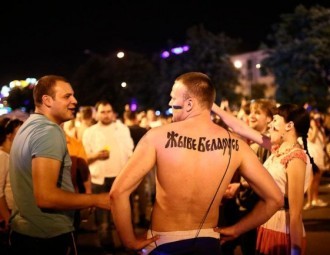Ihar Babkou: Russia-Ukraine war put the final nail in the coffin of the era

What has been happening with Belarusans during the last 25 years? Famous philosopher and literary man goes to the Congress in Kaunas to tell Europeans about it.
We continue talking with the Belarusan scientists, who are to take part in the 4th International Congress of Belarusian Studies, which is taking place in Kaunas (Lithuania) on October 3-5.
More than 450 scientists from 20 countries are attending the Congress, which is the biggest event for the Belarusan academic community. Researchers discuss the results of their work in the Vytautas Magnus University (VMU). Traditionally the Congress is focused on the whole region of Central, Western, and Eastern Europe.
We have already published thoughts of Andrei Kazakevich, an organizer of the Congress, the director of the Institute for Policy Studies Palіtychnaya Sphera (Political Sphere) regarding the Congress.
“Following locality: Belarusan intellectual history of modern times (1989-2014)” is the name of the plenary report, which will be presented by Ihar Babkou, the famous Belarusian philosopher and literary man at the opening ceremony of the Congress.
A correspondent of “EuroBelarus” Information Service talked with the winner of the Jerzy Giedroyc Prize and a teacher in the Flying University.
- What is intriguing about this Congress for you, and what do you expect from it?
- My goal is to try and suggest the vision of the Belarusan intellectual history of the last 20-25 years, which would be convincing and interesting for the representatives of all the different sections that gathered at the Congress.
Being not only a scientific conference, but also an important trans-science platform of international knowledge about Belarus, the Congress is an unprecedented event.
There are such platforms in Europe and in the world. And finally, we see how such platform is being formed in relation to the Belarusan reality.
Traditionally, Belarus is studied within philology, literature, and history. Belarusan studies are an attempt to see what is happening with us.
- What are the questions raised in your report?
- Everything that has been happening with us over the last 25 years. How being in contradiction with the new situation we have an opportunity to see it as a part of our intellectual history.
I’m sure that we can do that, as the era has ended: the thing we call communism; 2008, which was the year of the economic crisis, and 2014 – Russia-Ukraine war, which put the final nail in the coffin of the era. And the things that started afterwards are another story.
- What are the main intellectual and civic challenges that our countries are facing now, especially in the context of the Ukrainian crisis?
- This is not a question to give a short answer to. Clearly, some radical breaking is happening, but nobody has voiced what direction should we take.
- In your opinion, is the Congress the biggest event for the academic community of Belarusan scientists? And do we need an analogous event in Belarus?
- First, the Congress in Kaunas has already become a certain tradition. And secondly, Lithuania is in the EU, which quite easy to reach both for the European as well as for the Belarusan scientists.
It is a neutral territory that provides us with the possibility to discuss important things; the territory, which contributes to that. And if we see that something successful is already going on, it would be stupid to do the same thing in Belarus.
-
03.01
-
07.10
-
22.09
-
17.08
-
12.08
-
30.09



























